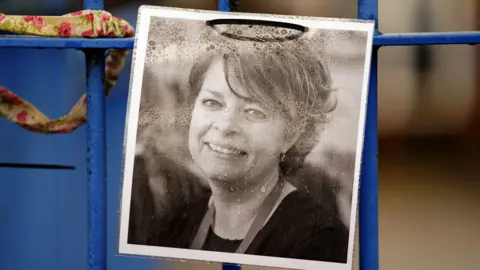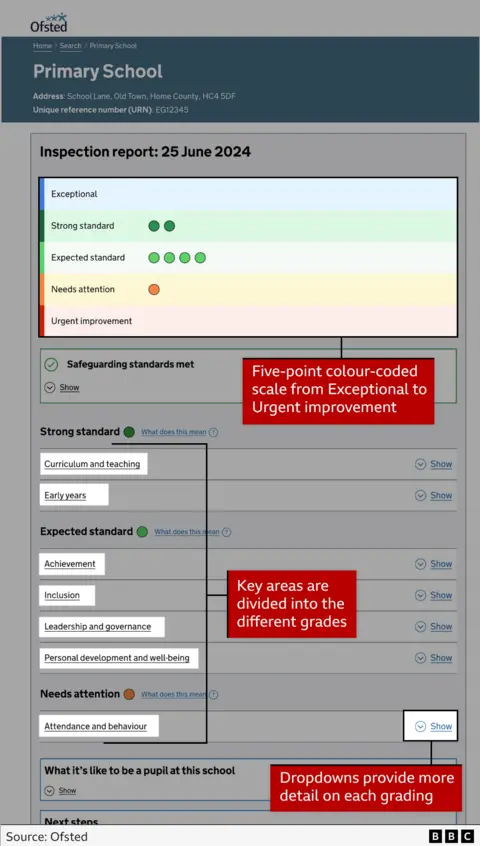Ofsted to bring in ‘report card’ school inspections despite criticism
2 hours agoAshitha NageshBBC News

 PA Media
PA MediaOfsted has confirmed it will push ahead with plans for a new “report card” system of inspecting schools in England, despite strong criticism from a coalition of school leaders, campaigners and former inspectors.
Last year it scrapped its old, one or two-word grading system, which ranged from “outstanding” to “inadequate”, in the wake of the suicide of head teacher Ruth Perry.
Ofsted said the report cards would give parents more detail, and would be brought into inspections from 10 November.
However, a group of those opposed to the plans, including Mrs Perry’s sister Prof Julia Waters, said the proposals “continue to pose a risk to the health and wellbeing of teachers and school leaders”.
The group has written to Education Secretary Bridget Phillipson, calling on her to intervene and delay the rollout of the plans.
In a joint letter, the group said Ofsted had “failed to learn the lessons” from the death of Mrs Perry, who took her own life in 2023 following an Ofsted inspection. A coroner ruled that the inspection contributed to her death.
“The proven life-threatening risks associated with a grades-based schools accountability system, based on public shaming and the fear of high stakes consequences, have not changed,” they added.
Announcing the expansion of a new system for improving schools, which will use the report card inspections, Phillipson said: “Every child deserves a brilliant education – and that means a system that’s relentlessly focused on strong accountability that puts children first.”
Under the new system, inspectors will use a five-point grading scale to mark schools across several different areas:
- Curriculum and teaching
- Early years
- Achievement
- Inclusion
- Leadership and governance
- Personal development and wellbeing
- Attendance and behaviour
These categories will be graded as either “exceptional”, “strong standard”, “expected standard”, “needs attention” or “urgent improvement”.
Report cards will also include sections on whether safeguarding standards have been met or not, what it is like to be a pupil at the school, what the next steps are for the school, and details of the inspection itself.
Ofsted said it would also bring in a new monitoring system, to allow schools to be reinspected on areas that need improvement more quickly after those improvements are made.


The new system was initially proposed at the start of this year, before a 12-week consultation.
Announcing the changes on Tuesday, Ofsted’s chief inspector Sir Martyn Oliver said: “Children deserve the best possible education, their parents deserve the best possible information and education professionals deserve to have their work fairly assessed by experts.”
Addressing the calls for a delay to the new system, he said there would be a “steady and assured start” and that the reforms had been “long in the making”.
Sir Martyn said there was “no comparison” to be made between the five new grades being launched in November and the grades used in the previous system.
He said the new report cards would provide a “fairer” assessment by describing all of a school’s strengths and areas for improvement.
But Prof Waters said it was “not a new system”, and was instead a “cosmetic rebranding, tweaking and expansion of the same unreliable and punishing system as the one before”.
“It still includes many of the risks that teachers and head teachers fear, without significant benefits or safeguards,” she added.
The leaders of several teaching unions, who signed the letter to the education secretary calling for a delay to the rollout, have also criticised the plans.
Daniel Kebede, general secretary of the National Education Union (NEU) said the new system was “more of the same. More pressure. More ranking and competition. More labels”.
Paul Whiteman, from the school leaders’ union NAHT, said Ofsted was “perpetuating a high-stakes punitive regime” for teachers, and that the changes “should not go ahead in their current state”.
Pepe Di’lasio, from the Association of School and College Leaders (ASCL), warned that the plan for implementing the new system was “far too rushed and gives schools little time to prepare”.
He said the new inspections would place “a huge amount of stress on school and college leaders and their staff because they will face so many judgements across so many areas”, while inspectors would need to make “a large number of finely balanced judgements in a very short space of time”.
‘Tools to improve’
David Hughes, chief executive of the Association of Colleges (AoC), said it was “clear that some positive changes have been made” as a result of feedback from staff in further education colleges during Ofsted’s consultation.
He said the AoC would support Ofsted and colleges in bringing in the new system, but that he was “concerned about the speed of implementation at the busiest time of the year for colleges”.
An independent assessment of the proposed system’s impact on the wellbeing of teachers, which was commissioned by Ofsted, was also published on Tuesday.
In it, Sinéad McBrearty, the chief executive of the Education Support charity, recommended that Ofsted make it a priority to reduce the high-stakes accountability of the inspection system.
She also said the government should promote wellbeing support for teachers, as well as increasing the personal help available to school leaders who receive a poor inspection.
The Department for Education has announced that the new report cards will contribute to a school improvement system that will help turn around “stuck” schools, which have received back-to-back negative judgements from Ofsted.
From this term, the new regional improvement teams will reach 377 schools in need of support.
“New school report cards will raise the bar for standards across the board, shining a light on what’s working and where change is needed,” the education secretary said.
“By providing a fuller picture of school performance – from attendance and behaviour to inclusion – we’re giving parents the transparency they deserve and schools the tools to improve.”
Additional reporting by Nathan Standley